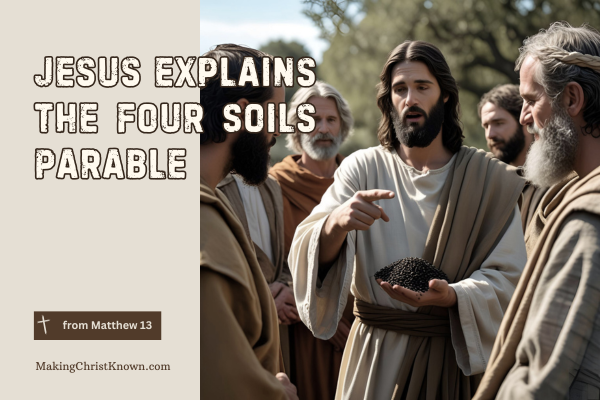Four Soils Parable – A Matthew Bible Lesson That Still Speaks Today
Have you ever felt like you’re trying to share your faith, but “they” aren’t listening? That’s what Jesus teaches in the Four Soils Parable—also known as the Parable of the Sower. It’s one of Jesus’ parables we relate to. And, it offers real insight into how people receive (or don’t receive) the gospel message.
This Matthew Bible lesson from chapter 13 shows us how the Word of God works like a seed. And our hearts are the soil. Read and see how it still applies to us today.
Jesus Teaches by the Sea
“That day Jesus went out of the house and was sitting by the sea. And large crowds gathered to Him, so He got into a boat and sat down, and the whole crowd was standing on the beach.” – Matthew 13:1-2 NASB
Many times, Jesus used everyday settings and familiar items to connect with the people. In this case, He taught from a boat so everyone on shore could hear. What He shared next would become one of His most well-known teachings.
The Four Types of Soil
“Behold, the sower went out to sow; and as he sowed, some seeds fell beside the road, and the birds came and ate them up. Others fell on the rocky places, where they did not have much soil… But when the sun had risen, they were scorched.” – Matthew 13:3-6 NASB
Jesus described more soil types:
- Thorny Soil: The worries of life and wealth choke out the Word.
- Good Soil: The Word takes root and produces a fruitful life—some 100, some 60, and some 30 times what was sown.
“He who has ears, let him hear.” – Matthew 13:9 NASB
Why Did Jesus Use Parables?
Jesus didn’t use complicated theology or what we refer to as “three-dollar words”. He used stories (parables) to teach ordinary people, especially farmers and villagers. He knew that open hearts would seek the deeper meaning.
Explaining the Four Soils Parable
Later, Jesus explained the meaning of the parable to His disciples.
“When anyone hears the word of the kingdom and does not understand it, the evil one comes and snatches away what has been sown in his heart.” – Matthew 13:18-19 NASB
Here’s how He breaks it down:
- Seed on the Path: People hear the message but don’t understand—it’s quickly taken away.
- Rocky Soil: People receive the Word with joy but fall away when life gets hard.
- Thorny Soil: Worry and materialism choke the message.
- Good Soil: These people hear, understand, and live out the message—producing fruit.
Sow the Seed Like Johnny Appleseed
Have you heard the story of Johnny Appleseed? He traveled across the land, planting apple trees wherever he went. Some of those seeds flourished into strong, fruit-bearing trees. Others never sprouted at all. Still, he didn’t stop. He kept planting with purpose and persistence.
In the same way, as believers, we’re called to keep sharing the message of Jesus. We may not know who will accept the Word, but we plant the seeds of truth and love in faith.
Is the World Full of Apples Yet?
Probably not. That’s exactly why the harvest remains plentiful. The work isn’t finished—and that’s where we come in.
Step Into Your Role in the Harvest
God gave us the good seed—His Word. He never asked us to judge the soil. Instead, He called us to take action and plant. Like farmers, we scatter the seed and trust God to do the growing.
And yes, some hearts may reject the message. But others will receive it and produce incredible fruit. So, let’s stay encouraged. Let’s keep sowing, keep planting, and keep believing.
The Seed is Good.. And God’s Truth is Eternal
The Four Soils Parable reminds us that hearts vary, but God’s truth stays the same. Our mission is clear:
- live out the gospel,
- speak it boldly,
- and trust God with the results.
If you’ve never accepted the love of Christ and you feel a tug at your heart, be sure to read John 3:16.
Love in Christ,
– Bob
Discover more from Making Christ Known
Subscribe to get the latest posts sent to your email.
